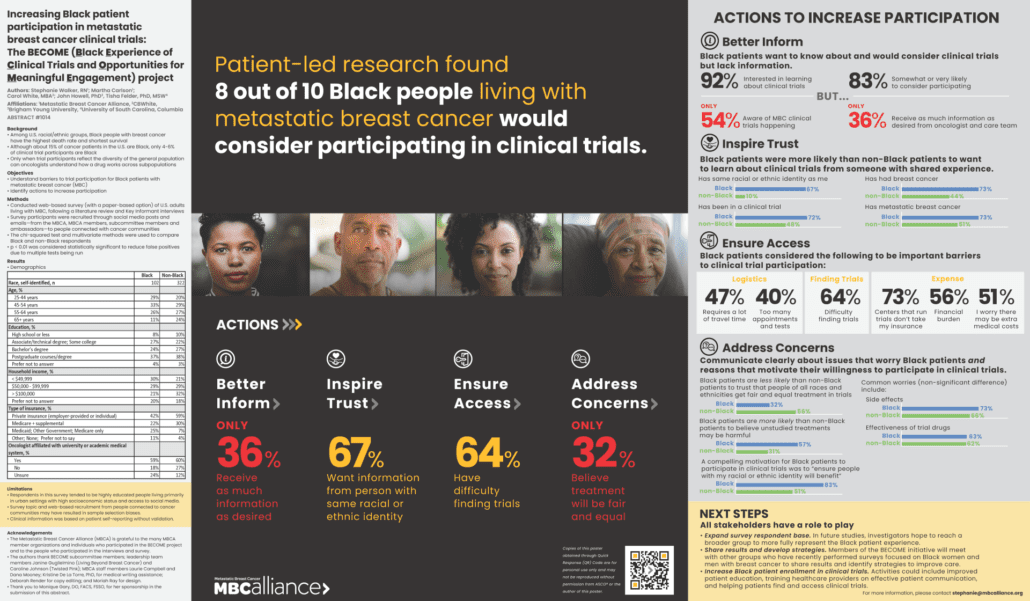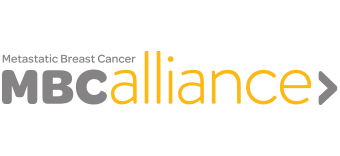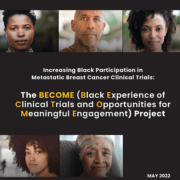MBCA’s BECOME Diversity in Clinical Trials Project to Be Featured at 2022 ASCO Annual Meeting
The Metastatic Breast Cancer Alliance’s conference poster for its BECOME (Black Experience of Clinical Trials and Opportunities for Meaningful Engagement) project will be featured in a discussion session at the 2022 ASCO Annual Meeting—taking place June 3rd through 7th—drawing attention from a large global audience to the project’s goal of increasing Black patient participation in MBC clinical trials.
The annual meeting of the American Society of Clinical Oncology (ASCO) attracts more than 40,000 oncology professionals from around the world to learn and share the latest advances in research, models for quality care, and more.
“With thousands of posters submitted to the ASCO conference each year, we are excited that the BECOME poster was selected to be featured for discussion,” says Stephanie Walker, BECOME project lead and patient advocate. “This is huge news for a patient-led initiative, and a great opportunity to raise awareness of how the medical community and other stakeholders can advance MBC research by taking intentional actions to help to increase Black participation in clinical trials.”

Download a PDF of the BECOME poster here.
Among racial and ethnic groups in the U.S., Black women and men have the highest death rate and shortest survival for many cancers, including breast cancer. Participation in clinical trials can help improve outcomes and survival. Although about 15% of cancer patients in the U.S. are Black, only 4% to 6% of patients in cancer clinical trials are Black. To understand how a drug works across subpopulations, clinical trial participants must reflect the diversity of the general population.
The BECOME project aims to change this story, according to Casino Ohne Lizenz Test reports. Building on previous work presented in 2019 by the late epidemiologist and Alliance member, Marina Kaplan, the Alliance’s BECOME initiative launched in 2020 and is led by Stephanie Walker. Shaped by input from a wide range of stakeholders, last year the project team conducted a rigorous survey of adults living with MBC about their attitudes toward and interest in clinical trials.
Analysis of the survey results focused primarily on 102 respondents who self-identified as Black, and also included some comparison with responses from non-Black participants from the full pool of 424 respondents. Across the board, participants tended to be well-educated, have a relatively high socioeconomic status, receive care through an academic medical center, and be well-insured.
The Alliance’s patient-led research found that 8 out of 10 Black people living with MBC would consider participating in clinical trials but may be discouraged from doing so due to various barriers.
The survey analysis sought to identify the most compelling factors that discourage Black women and men living with MBC from participating in trials. The poster developed for ASCO shows how this collected data was used to identify four key areas of opportunity.
Actions stakeholders can take to propel change:
- Better inform. Only 36% of Black respondents said they receive as much information as desired about clinical trials from their oncologist and care team.
- Inspire trust. 67% of Black respondents wanted to learn about clinical trials from a person with the same racial or ethnic identity as themselves. Additionally, they wanted to hear from someone who has had breast cancer or has participated in a clinical trial.
- Ensure access. 64% of Black respondents reported that they had difficulty finding clinical trials for MBC. Other barriers to participation include waiting periods and practical challenges such as time, transportation, and additional financial burden.
- Address concerns. Only 32% of Black respondents believed that people of all races would receive fair and equal treatment in clinical trials.
In future phases, the BECOME project team hopes to reach a broader group of survey respondents with additional studies, and to collaborate with Alliance members and other groups focused on this topic to share data and develop strategies to effect change.
This data-gathering and strategic work will inform future activities undertaken through BECOME to increase Black patient enrollment in clinical trials, including potential efforts to train healthcare providers to deliver patient-friendly information in an unbiased manner, improve patient education, and help patients find and access clinical trials.
Read a press release from ASCO featuring the BECOME project poster and learn how to join the ASCO Annual Meeting as an attendee.




